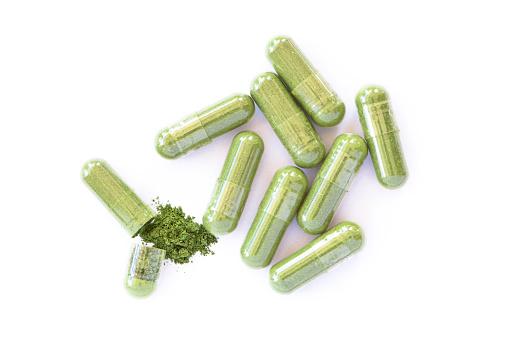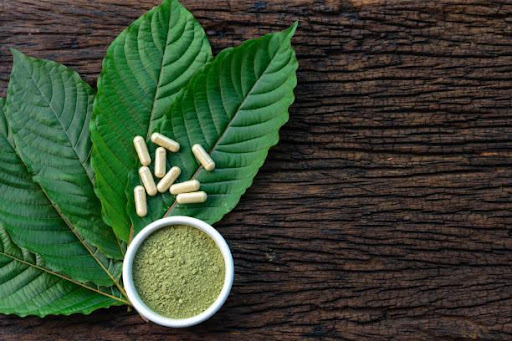“Does Kratom show up in drug tests?” The answer depends on the type of test.
While it won’t appear on a standard 5-panel drug test, it can be detected in blood or urine tests. There’s also a specific test, the kratom 10-panel test, for this purpose.
Kratom appears on some drug tests but is not as common as more dangerous substances. Notably, Kratom is legal at the federal level and in most states, so authorities and employers may not test for it if it’s not illegal in your state.
Even advanced testing methods used for high-level positions may not include kratom screening due to its relative obscurity as a drug of abuse.
Let’s now explore what Kratom is.
What Is Kratom?
Kratom is a tree native to Asian countries like Thailand, Indonesia, and Malaysia. The plant is closely related to coffee plants. Traditionally, most people eat the leaves of the kratom plant, where it grows, to reap its stimulant benefits.
In addition, many brew kratom tea using plant leaves to boost energy levels, productivity, and agility. Besides, people also use kratom leaves for medical purposes, as they have potent pain-relieving features.
Kratom has acquired legal status in many US states and is also federally legal. Therefore, the US population has turned to its consumption to benefit from this anti-inflammatory plant.
Many manufacturers have introduced their kratom product lineups to offer a constant supply of high-quality kratom supplements and products. In the online market, finding a wide variety of kratom products, including capsules, dietary supplements, teas, tablets, gum, and powders, is a piece of cake.
Many vendors sell Kratom under alternate names of the plant, including Mitragyna. Moreover, this plant’s street names are thang, biak, thom, and ketum.
Anecdotal research on Kratom asserts that Kratom can assist in the recovery from opioid drug abuse. Kratoms trigger the same receptors as opioids and bring about comparable benefits.
Therefore, Kratom suppresses cravings and relieves opioid withdrawal symptoms common in people.
How Does Kratom Work?
Like psychoactive drugs, Kratom has stimulant-like properties when you consume it in low doses. Contrastingly, when consumed in higher doses, Kratom’s effects lead to benefits similar to those of opioids.
Opioids, sedation, and pain-relieving characteristics are some of the primary stimulatory actions of Kratom. Therefore, people often consume Kratom to self-medicate health conditions such as sleep, depression, opioid withdrawal, and pain.
It is typically ingested by mouth, but some forms of Kratom are not safe for use and are labeled as “not for human consumption.” Besides, Kratom may induce undesirable side effects, including frequent urination, weight loss, nausea, diarrhea, overheating, and sweating.
According to the Drug Enforcement Administration (DEA), Kratom is not included in the definition of a controlled substance. However, it should be used cautiously, as prolonged use of Kratom may lead to addiction and physical dependence.
Does Kratom Show Up On A Drug Test?
Kratom is typically not detected on standard drug tests, focusing primarily on common substances like marijuana, cocaine, and opioids. If you’re using kratom and concerned about drug testing, rest assured that it’s unlikely to trigger a positive result. However, if you want additional peace of mind, consider using detox kits to ensure accurate testing outcomes.
Does Kratom Show Up On A Blood Test?
Blood tests can be conducted to check if a person consumes Kratom and how much is in the blood. The concentration levels of Kratom will be visible on blood test results, as it is easy to detect it in the blood.
If you have a kratom addiction or are a long-term user of it, the possibility of kratom metabolites showing up on the test will be high. However, blood tests usually give shorter detection windows for drugs.
Does Kratom Show Up On A Urine Test?
Kratom typically does not show up on standard urine drug tests. However, specialized tests specifically designed to detect kratom metabolites may yield positive results. In such cases, individuals may explore various options, including synthetic urine, to pass the urine test successfully.
Does Kratom Show Up On A Saliva Test?
Standard saliva drug tests typically focus on detecting common substances like marijuana, cocaine, and opioids rather than kratom. Kratom’s alkaloids are not usually the primary targets for saliva testing. As such, it’s less likely for kratom to be detected in saliva tests.
Does Kratom Show Up On A Hair Test?
Hair drug tests primarily aim to detect long-term drug use patterns but generally do not target kratom alkaloids. While theoretically possible, kratom is not typically included in standard hair testing panels. The likelihood of kratom detection via hair tests is low.
How Does Your Body Metabolize Kratom?
Researchers assert that your liver metabolizes Kratom like it metabolizes all other drugs and chemicals. The liver breaks down Kratom into 7-OH-mitragynine using specific liver enzymes.
Scientists suspect that 7-OH-mitragynine is the active substance that leads to Kratom’s popular effects and benefits. Since there is a lack of human studies, it is unclear whether humans respond similarly to animals.
Moreover, your body excretes mitragynine in small concentrations in urine. Because the drug levels in urine are so small, experts believe that the liver does the primary metabolization and excretion of Kratom.
How Long Does Kratom Stay In Your System?
Kratom is available in different types and has dose-dependent effects. It is safe to say that mitragynine is the primary suspect for all those effects. While low doses have soothing effects, higher doses of Kratom can lead to effects that can last for hours.
Specifically, you can feel the Kratom high within five to ten minutes, while its psychoactive effects last for two to five hours. The duration of Kratom’s euphoria is directly related to the amount of drug you consume.
If you consume a dosage of 4-5 grams, the effects will last up to two hours. However, a high 7-8 gram dosage produces potent, longer effects. Still, you can observe the peak effects of Kratom around 1.5 to 2.5 hours after its consumption.
Moreover, if you have it on an empty stomach, you will likely experience its stronger effects. So, if you don’t want heightened impacts, you can eat it after having your meal, and the effects will show after one hour. Besides, if taken as a capsule, kratom effects are visible after one hour since it has to dissolve in your stomach.
Kratom Half-Life
When you are considering stopping kratom use, knowing the kratom half-life may be of help. The kratom half-life has a role in deciding the duration of the drug in your system. So, if you have a kratom addiction, it can tell you when your body will show withdrawal symptoms.
Most importantly, if you are drug tested, the kratom half-life can help you ditch the possibility of negative results. However, it does not show up in traditional drug tests.
The research on Kratom is limited, and most studies are conducted on animals. Therefore, the drug’s half-life is not completely apparent. Still, the current research on Kratom suggests that mitragynine has a half-life of about 23-24 hours, the primary alkaloid.
Using this information, it is safe to say that your body will take up to a full day to eliminate 50% of kratom metabolites. In other words, your body will be cleared of Kratom within five days.
Furthermore, another study suggests that the fastest half-life of kratom metabolites in your body could be two hours. According to it, eliminating Kratom will take over a half day.
In contrast, the complete elimination will take around nine days, as per the likelihood of a slower metabolism in Kratom. However, you should note that the half-life measurements can vary from one person to another depending on the usage frequency.

Factors Affecting The Stay Of Kratom In Your System
Several factors regarding the duration of kratom metabolites in your body are worth mentioning. Some of them are as follows:
Dosage And Method Of Usage
As we have mentioned, the effects of Kratom are dose-dependent. If you take a higher kratom dosage, the drug will stay in your system for a long time. However, the duration will be shorter when you consume Kratom in a smaller dose. Moreover, if you take it orally as a pill or in tea, Kratom will stay in your body longer than if you smoke it. Note that smoking kratom is uncommon.
Type Of Kratom Leaves
Kratom leaves have different vein colors; green, red, and white are the most common. White kratom leaves are highly potent and have strong stimulatory effects that can last several hours.
Red leaves produce sedation, while green leaves have mild effects and elevate energy levels. The impact of green leaves is visible for more than eight hours.
Age And Weight
As you age, your metabolism becomes sluggish compared to younger individuals. Therefore, older individuals require more time to metabolize and eliminate the drug from the system.
Like marijuana, Kratom is a fat-soluble drug that accumulates fat in your body. So, individuals with a higher amount of body fat are more likely to have significant traces of Kratom for a longer time window.
Hence, if you are particularly over 65, kratom metabolites will remain in your body longer than in younger people.
Genetics
Although not proven, genetics may have a role in the body’s half-life and excretion of Kratom. Certain enzymes and genetic markers are believed to be involved in this process.
Food And Water Intake
Diet can play a significant role in absorbing and eliminating Kratom from your body. For instance, taking Kratom after eating a high-fat meal will quickly be absorbed by your body. As a result, the kratom product will elicit its peak effects faster.
Besides, hydration levels can suppress or boost the excretion of Kratom from your system. If your body is well-hydrated, you can expect it to purge itself more quickly through the urine.
Kratom False Positive Result
It is uncertain whether Kratom can give falsely positive results. According to experts, this drug can lead to false positives in opioid drug tests, including tests for methadone. If a confirmation test follows the results, it will show the absence of opioids.
How Long Do Kratom Withdrawal Symptoms Last?
The severity and duration of kratom withdrawal vary from one individual to another. The amount of Kratom and how long they have consumed it impact the symptoms.
If you use it in low doses, you may not experience any withdrawal symptoms. However, the withdrawal symptoms might be severe for heavy kratom users. Some common kratom withdrawal symptoms include sweating, nerve pain, trouble sleeping, and runny noses and eyes.
How Can Kratom Possibly Benefit Me?
Mitragyna speciosa, a fascinating botanical with promising potential. Its leaves harbor alkaloids, which have shown potential benefits for wellness routines (note: as a non-FDA-approved product, these benefits are speculative). Explore the possible advantages of Kratom:
- Pain relief: Kratom has been traditionally used to alleviate chronic pain, headaches, and menstrual cramps.
- Improved mood: Users believe Kratom can uplift mood and ease symptoms of anxiety and depression.
- Opioid withdrawal: Kratom may mimic opioid effects with fewer risks, aiding individuals in overcoming addiction (professional help is recommended).
- Stimulant: Low doses of Kratom may offer increased energy and improved focus.
- Sedative: High doses of Kratom may induce a calming effect, acting as a sedative.
- Anti-inflammatory: Kratom’s potential anti-inflammatory properties may help with certain conditions.
- Antioxidant: Antioxidants in Kratom could protect cells from damage by free radicals.
However, it’s essential to acknowledge that most Kratom studies involve animals, and further research is necessary to understand its benefits and risks fully. Kratom products in stores are not intended to cure, treat, or prevent the mentioned ailments, and consumers should not expect them to do so.

Concluding Thoughts on Kratom and Drug Testing
In the United States, Kratom is legal at the federal level, with many states also permitting its use. The market offers various forms, such as pills, tablets, leaves, and powders.
While small doses induce sedation, higher doses may lead to mental health disorders, addiction, or substance abuse. Notably, failing a standard 5-panel drug test due to Kratom use is unlikely, but a specific Kratom 10-panel test may detect it.
Given the lack of FDA regulation on Kratom doses, seeking professional medical advice is crucial when using it for self-medication.
Prioritize your well-being and make informed decisions with expert guidance.



